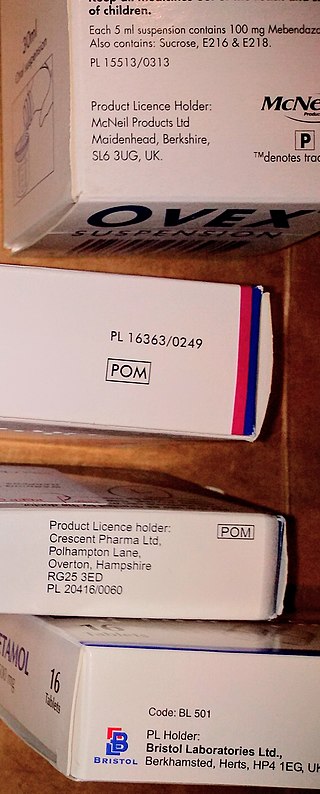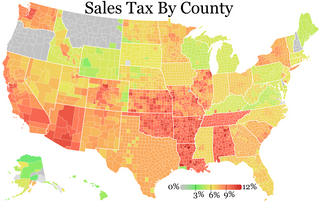Related Research Articles

A prescription drug is a pharmaceutical drug that is permitted to be dispensed only to those with a medical prescription. In contrast, over-the-counter drugs can be obtained without a prescription. The reason for this difference in substance control is the potential scope of misuse, from drug abuse to practicing medicine without a license and without sufficient education. Different jurisdictions have different definitions of what constitutes a prescription drug.

The Medicare Prescription Drug, Improvement, and Modernization Act, also called the Medicare Modernization Act or MMA, is a federal law of the United States, enacted in 2003. It produced the largest overhaul of Medicare in the public health program's 38-year history.
Walgreens is an American company that operates the second-largest pharmacy store chain in the United States, behind CVS Health. It specializes in filling prescriptions, health and wellness products, health information, and photo services. It was founded in Chicago in 1901, and is headquartered in the Chicago suburb of Deerfield, Illinois. On December 31, 2014, Walgreens and Switzerland-based Alliance Boots merged to form a new holding company, Walgreens Boots Alliance. Walgreens became a subsidiary of the new company, which retained its Deerfield headquarters and trades on the Nasdaq under the symbol WBA. In 2021 the company was found by a federal jury to have "substantially contributed to" the opioid crisis.

The California special election of 2005 was held on November 8, 2005 after being called by Governor Arnold Schwarzenegger on June 13, 2005.

Sales taxes in the United States are taxes placed on the sale or lease of goods and services in the United States. Sales tax is governed at the state level and no national general sales tax exists. 45 states, the District of Columbia, the territories of Puerto Rico, and Guam impose general sales taxes that apply to the sale or lease of most goods and some services, and states also may levy selective sales taxes on the sale or lease of particular goods or services. States may grant local governments the authority to impose additional general or selective sales taxes.
Official website

Tricare is a health care program of the United States Department of Defense Military Health System. Tricare provides civilian health benefits for U.S Armed Forces military personnel, military retirees, and their dependents, including some members of the Reserve Component. Tricare is the civilian care component of the Military Health System, although historically it also included health care delivered in military medical treatment facilities.
The Oregon Health Plan is Oregon's state Medicaid program. It is overseen by the Oregon Health Authority.
The Medicaid Drug Rebate Program is a program in the United States that was created by the Omnibus Budget Reconciliation Act of 1990 (OBRA'90).
Healthcare reform in the United States has a long history. Reforms have often been proposed but have rarely been accomplished. In 2010, landmark reform was passed through two federal statutes: the Patient Protection and Affordable Care Act (PPACA), signed March 23, 2010, and the Health Care and Education Reconciliation Act of 2010, which amended the PPACA and became law on March 30, 2010.

ISO New England Inc. (ISO-NE) is an independent, non-profit regional transmission organization (RTO), headquartered in Holyoke, Massachusetts, serving Connecticut, Maine, Massachusetts, New Hampshire, Rhode Island, and Vermont.
Aggregate Spend is the process used in the United States to aggregate and monitor the total amount spent by healthcare manufacturers on individual healthcare professionals and organizations (HCP/O) through payments, gifts, honoraria, travel and other means. Also often referred to as the Physician Payments Sunshine Act, this initiative is a growing body of federal and state legislations intended to collectively address all or some of the following goals:
Medicaid estate recovery is a required process under United States federal law in which state governments adjust (settle) or recover the cost of care and services from the estates of those who received Medicaid benefits after they die. By law, states may not settle any payments until after the beneficiary's death. States are required to adjust or recover all costs under certain circumstances, all involving long-term care arrangements. Federal law also gives states the option to adjust or recover the costs of all payments to health care providers except Medicare cost-sharing for anyone on Medicaid over the age of 55.

There are ten states in the United States of America with container deposit legislation, popularly called "bottle bills" after the Oregon Bottle Bill, the first such legislation that was passed.
Pharmaceutical fraud is when pharmaceutical companies engage in illegal, fraudulent activities to the detriment of patients and/or insurers. Examples include counterfeit drugs that do not contain the active ingredient, false claims in packaging and marketing, suppression of negative information regarding the efficacy or safety of the drug, and violating pricing regulations.
The 340B Drug Pricing Program is a US federal government program created in 1992 that requires drug manufacturers to provide outpatient drugs to eligible health care organizations and covered entities at significantly reduced prices. The intent of the program is to allow covered entities to "stretch scarce federal resources as far as possible, reaching more eligible patients and providing more comprehensive services." Maintaining services and lowering medication costs for patients is consistent with the purpose of the program, which is named for the section authorizing it in the Public Health Service Act (PHSA) It was enacted by Congress as part of a larger bill signed into law by President George H. W. Bush.
The Office on Women's Health (OWH) is part of the U.S. Department of Health and Human Services (DHHS) and functions to improve the health and well-being of U.S. women and girls. The main headquarters, from which the OWH operate, is located in Washington, DC with ten other regional women's health coordinators positioned across the country to implement local health initiatives.
The Affordable Care Act (ACA) is divided into 10 titles and contains provisions that became effective immediately, 90 days after enactment, and six months after enactment, as well as provisions phased in through to 2020. Below are some of the key provisions of the ACA. For simplicity, the amendments in the Health Care and Education Reconciliation Act of 2010 are integrated into this timeline.
The Smarter Balanced Assessment Consortium (SBAC) is a standardized test consortium. It creates Common Core State Standards-aligned tests to be used in several states. It uses automated essay scoring. Its counterpart in the effort to become a leading multi-state test provider is the Partnership for the Assessment of Readiness for College and Careers (PARCC).

In the context of American public healthcare policy, the Medicaid coverage gap refers to uninsured people who do not qualify for marketplace assistance under the Affordable Care Act (ACA) and reside in states that have not adopted Medicaid expansion under the ACA. People within this categorization have incomes above the eligibility limits for Medicaid set by their state of residence but fall below the federal poverty line (FPL), resulting in deficient access to affordable health insurance. As of March 2023, an estimated 1.9 million Americans in 10 states are within the Medicaid coverage gap according to the Kaiser Family Foundation. Approximately 97 percent of this cohort lives in the Southern U.S., with a majority living in Texas and Florida; Texas has the largest population of people in the cohort, accounting for 41 percent of people in the coverage gap.
References
- ↑ Freudenheim, Milt (2005-02-03). "Employers Unite in Effort to Curb Prescription Costs". The New York Times . Retrieved 2010-03-19.
- ↑ Cauchi, Richard (February 2010). "Bulk Purchasing of Prescription Drug - NCSL 2010". National Conference of State Legislatures . Retrieved 2010-03-19.